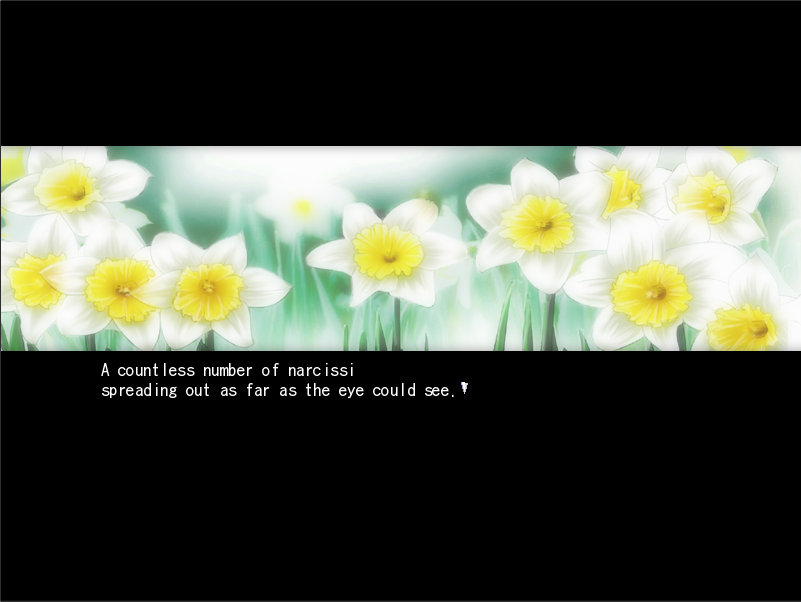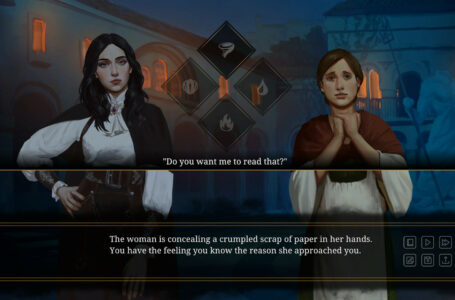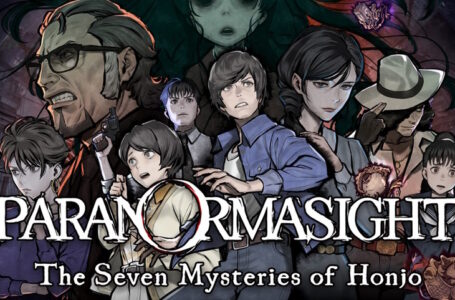Visual Novel Spotlight: Narcissu
Narcissu is a short drama visual novel about inevitability and dying wishes. On the seventh floor of a fictional hospital, two characters meet – one, a man who only recently has been admitted, and the other a woman who will likely soon die. One day they both escape the hospital and journey across the southern Japanese coastline to meet their deaths.
Narcissu is narrated through the eyes of two patients doomed to die on the seventh floor of a hospital in Ibaraki prefecture, Japan. Most of the story is seen through the eyes of an unnamed protagonist during his first admittance to hospital. There he sees only one other person: a girl called Setsumi, seemingly younger than he is, with a permanent melancholy surrounding her. After a few short exchanges about the choice to die at home or in the hospital, the protagonist makes a sudden decision and takes Setsumi on a trip so she can die where she wants.
It’s no secret that Narcissu is a depressing read. Both characters have no future and nothing will change that. Both of them have accepted their fate somewhat but it’s how they come to take action and re-accept that fact that makes the story. It’s also interesting to note that this whole game seems to be based on speculation of how one of Japan’s 2005 suicide statistics came to happen.
Despite the ever-present threat of death, the game is able to set up a comfortable atmosphere once the two leave the hospital. There are underlying depressing themes which are brought up every so often, but there are nice breaks where the characters get to interact in a semi-light-hearted way. It’s still not quite the game you play for these moments, though.
While the narration is from the man for most of the game, the story is all about Setsumi. To some extent, even the unnamed protagonist takes a back seat. He has no firm goal and is still largely undecided about how he wants to die, despite that being the thing that is discussed most. The majority of the game is him trying to please Setsumi and somehow fulfil her unspoken dying wishes. Seemingly to push him further to the background, only Setsumi is voiced.
Narcissu has an interesting presentation whereby the story is only given two lines at a time. As everything is rather brief, this isn’t much of a problem, though there are a lot of points where the text speed is intentionally slowed down for impact. If you are a fast reader or want something with a little more prose-like display, you may find the game can be annoying at times.
The visuals are restricted to a cinematic letterbox but are quite pleasant to look at, particularly when sound effects link them together well. The backgrounds are a mix of illustration and edited photos, but aren’t too jarring next to each other. Character art is left out for the most part, save for infrequent shots of Setsumi. The visuals, coupled with the spare dialogue, give Narcissu a comfortable but bare look, which ties into the brevity of the character’s lives. It also just looks nice.
Narcissu is a short game and not one to be played if you’re looking for a story where everyone is saved. While it has moments of light-heartedness, it doesn’t shy away from death and the whole story is a journey to such an end. The visuals and narration style complement the story well but can be irritating to fast readers. Regardless, Narcissu is worth taking a look at.
Narcissu can be downloaded for Windows, Mac and Linux for free on Insani’s English translation site. As the game was originally free and the creators, stage-nana, give permission for all translations, there’s no need to worry about legal issues. The prequel to this game, Narcissu –Side 2nd-, expands on Setsumi’s past and can be found translated here. Narcissu’s sequel, Narcissu – if there was a tomorrow -, bundles all previous releases under the Narcissu title but is not translated.
- Visual Novel Spotlight: Corpse Party: Blood Drive - November 3, 2015
- Visual Novel Spotlight: A Kiss For The Petals – Remembering How We Met (PC) - September 29, 2015
- Visual Novel Spotlight: Sakura Swim Club - September 15, 2015








